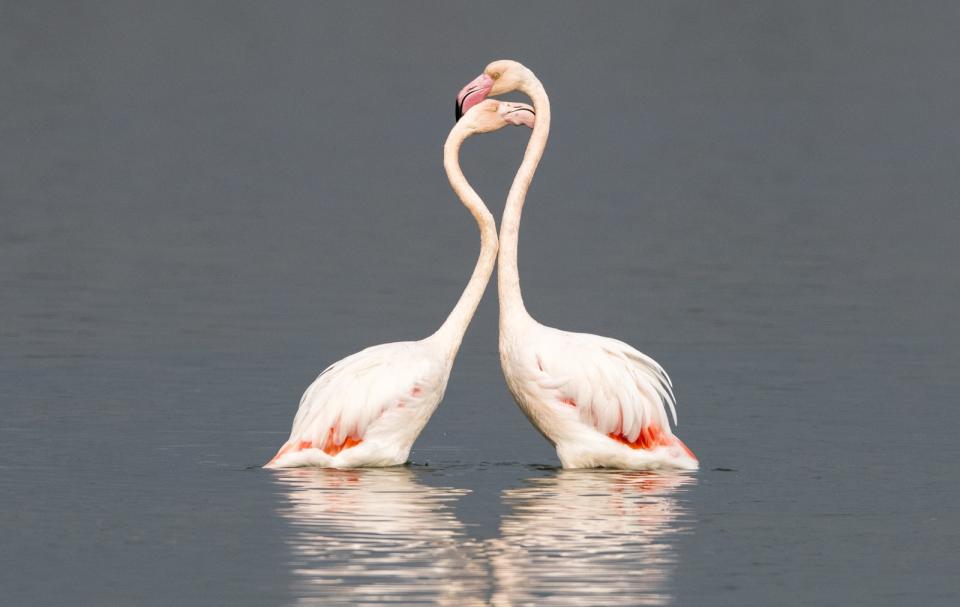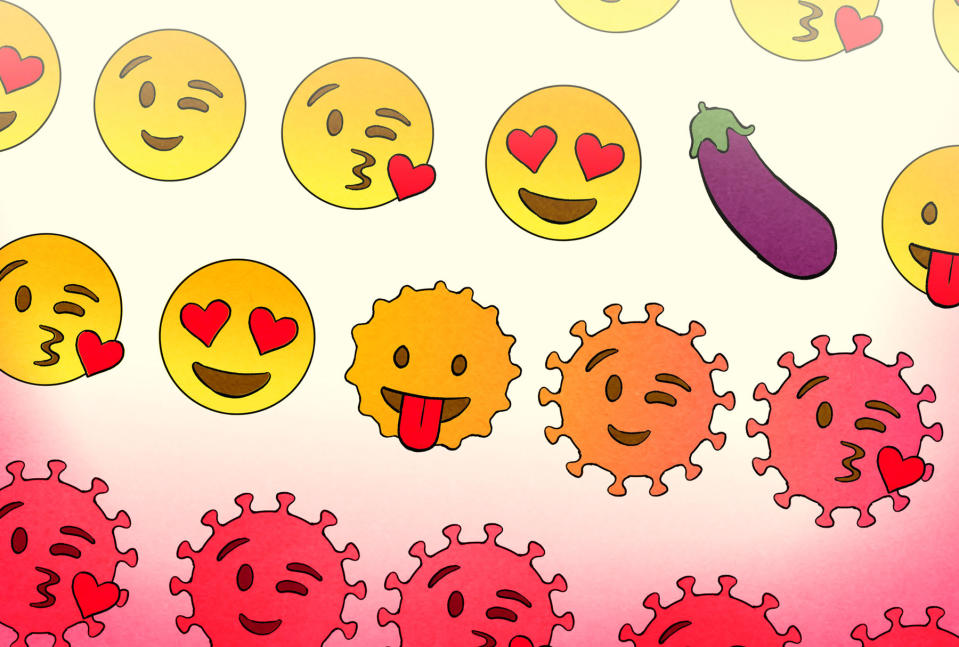We need to talk about sex, tech and COVID-19
We’re all long-distance baes now.
For the horny and lonely, sex and dating continues during the coronavirus pandemic. While Big Tech sticks its head in the sand, forcing its users to adapt, the sex industry leverages tech to show us how to play safe.
When asked about coronavirus and dating safety earlier this week, Bumble mumbled to press about its video chat features — evasions on par with how the company avoids talking about sexual health. Grindr is at least up-front about the topic; even still, the hookup app has no info on the erotic quandaries of quarantine.
Tinder, for its part, has acknowledged the coronavirus. But rather than actually talk about hookups and viral loads, the dating app avoided the specific reason why it would say anything in the first place. "While we want you to continue to have fun," its glib pop-up stated, "protecting yourself from the Coronavirus is more important." This was followed by a four-point "wash your hands" shortlist and a link to the World Health Organization.
Grindr serves 5 million users worldwide; Bumble has 22 million. Tinder counts 50 million members globally. Since sex and dating is a contact sport, you'd think that being able to tell 77 million people specific ways not to die while using their dating apps would be of the utmost urgency. Think about it: they have a unique chance to talk about what's really going on with quarantine quandaries and tech-enabled hookups.
But ew, sex. It's like they either forgot that dating's raison d'être is intimacy — or they're shoveling a bullshit pretense that their apps have nothing to do with sex.

Dating and hookup app users have adapted to COVID-19, even if prudish tech companies haven't. There's a surge in bios now looking for quarantine amor; cuddle pals and shut-in lovers, to "ride it out," if you will. It's enough to make the "wash your hands" pop-ups look criminally negligent. Buzzfeed reported Tinder users saying they weren't that concerned about catching coronavirus, with one male saying he has "no intention of letting it dictate my social life."
I'll bet those 77 million people desperately want to know how "social distancing" applies to hand-holding. Or how to know if (or when) it's safe to kiss someone. Tinder's "distancing" caution specified "public gatherings," but what about private gatherings?
That's tens of millions actively wondering right now: is novel coronavirus similar to other STDs? Like, even if you wore sexy rubber catsuits and kept your bits covered in latex, can anyone bang safely right now? Is this the AIDS epidemic all over again, where the desire for sex is reviled like having a death wish? What horrible future are we in now that all dating has become... teleconferencing?
More to the point, we have to wonder if coronavirus infections will spread because Big Tech is too scared to talk plainly and non-judgmentally about COVID-19, human desire, and sexual communication.
"If dating apps wanted to follow the protocols of the adult industry," explained Free Speech Coalition Communication Director Mike Stabile, "they should realize that, in a public health crisis, they are a unique portal to the population and can be an effective way to communicate information."
When the adult industry sees a potential risk to the performer pool, we shut down PASS — the performer testing system — to alert performers and producers that there is a production hold.
The adult industry has survived and thrived precisely because we do talk about sexual health and safety constantly. Society needs to learn to talk about sexual risk in a way that's not stigmatizing or accusatory, but as medical fact.
"Not everyone reads the news or is on social media," Stabile added. "We all have our part to play."
Can't swipe it away
Like everyone else, adult performers and other sex industry workers are concerned about coronavirus transmission risks. The Free Speech Coalition posted a porn-industry-specific COVID-19 advisory last week, describing new behaviors to adopt for coronavirus safety in a sexual atmosphere. "In some ways, this is familiar territory for us," explained FSC's Stabile. "Despite the intimate nature of our business, our sets are smaller and crew are already trained in safe handling of bodily fluids."
If only the stewards of bazillion-dollar tech apps were as innovative and efficient as the sex industries they exclude and erase at every turn. "The adult industry is used to talking about risk-mitigation, and already have an infrastructure set up with health and testing protocols," Stabile said, noting that all performers are notified en masse when there's a health risk to the population, and doesn't generalize about it in a quick pop-up linking to the WHO.
Bumble's upsell to its videoconference product, by comparison, was crass and a missed opportunity to say why safer coronavirus sex matters now more than ever. FSC told Engadget that "some performers are already shifting toward more self-produced content, cams and solos." And this is exactly how wider sex work communities are shifting as the business of sexual intimacy meets stark COVID-19 transmission concerns for both workers and their clients.
"On Tuesday," wrote an anonymous sex worker, "politician Lord Bethell spoke in the House of Lords about the risk of transmitting coronavirus through kissing and other forms of social intercourse, saying: "Kissing is wonderful but potentially dangerous." As an in-person sex worker, this isn't good for business."
Former full-service sex worker and author of the Thriving in Sex Work series Lola Davina told Engadget via email, "Any time social distancing is the solution to a problem, contact sex workers, including strippers, masseuses/masseurs, professional dominants, and full service sex workers will be hit hard."
Evolving faster than tech companies, online workers are stepping up to coach others to find new, non-contact ways to get the job(s) done. And while the Senate GOP blocked an emergency paid sick leave bill intended to deal with the fallout of coronavirus, the Sex Worker Aid Initiative of Seattle sprang into action and launched a "COVID19 #MutualAid fund and emergency response for affected community members."
Dating apps could learn a lot from sex workers about what to say to their 77 million scared and horny users -- all of whom are at risk now. Writer and performer Lorelei Lee offers cleaning details revealing that a BDSM dungeon is probably one of the lowest-risk locations you could find yourself in a pandemic. New York based escort fera lorde spelled it all out in an informative Twitter thread. "We already use (sometimes medical grade) sanitation products for laundry, surfaces, doorknobs, toys, hands – you name it. I've never worked in an incall that didn't have a plethora of sanitation products and antibacterial soap/hand sanitizer on hand and stocked up..."
How I, A Sex Worker, Am Handling COVID19 - a thread!
I wanted to address this because clients are *blowing me up* about it - so here we go!
As SWs, we are *already* vigilant about our intimate work and keeping transmission risks to a minimum. Here are some steps many of us take— fera lorde (@feralorde) March 10, 2020
Needless to say, coronavirus safety advice to 77 million people using your app to hook up is quite different than advice for going to Trader Joe's and panic buying all the frozen Mandarin Orange Chicken. Especially when you consider that the pandemic and quarantine is now projected to have a massive sexual impact on the general population.
A pandemic in your pants
This week, San Francisco AIDS Foundation posted a very detailed information page about steps to prevent novel coronavirus — far more on social distancing than Tinder's pop-up. UCSF posted really helpful notes from its expert panel on COVID-19, explicitly stating that routes of infection occur in three ways: "Hand to mouth / face; Aerosol transmission; and, Fecal oral route."
The Guttmacher Institute looked at the bigger picture, detailing expected outcomes of current response and our certain sexual doom in its COVID-19 outbreak post, Potential Fallout for Sexual and Reproductive Health and Rights.
"Unlike the Zika virus outbreak," Guttmacher wrote, "where sexual and mother-to-infant transmission were well-established, much less is known today about these potential transmission routes for COVID-19." That sounds to me like something every horny app user on Earth should know right now.
Further, Guttmacher detailed:
At the health system level, we may see shortages of medications—such as contraceptives, antiretrovirals for HIV/AIDS and antibiotics to treat STIs—due to disruptions in supply chains overall.
...health authorities have recommended that people stock up ... items like oral contraceptives, the contraceptive patch and ring, condoms, spermicide and lubrication will be important items on that list. However, building that stockpile might be difficult because of supply shortages and insurance practices that often limit reimbursement to just one month of prescription drugs at a time.
So while some joke on social media about all the COVID-19 babies we'll be seeing in December, everyone else who works in sexual health is deeply, terribly worried about a certain spike in STDs and STIs. It's one thing if dating and hookup apps could let everyone know that kissing, and yes, banging, is a way you can become a vector to accidentally infect your grandma with coronavirus. But it seems equally urgent for Big Tech to tell thirsty users that most condoms are made in China, there are predicted birth control pill shortages, as well as meds to deal with sexually transmitted infections and diseases.
Also, lots of unwanted pregnancies. And there's a chance diseases like HIV could become lethal once again as the availability and access to PreP and antivirals dry up.
Plus, while Trader Joe's was getting its shelves wiped clean in San Francisco this week, I noticed that Bed Bath and Beyond was seeing its shelves of condoms diminish -- and that was Thursday.
Thirsty for the truth
As a trained sex crisis counselor (and a training speaker for sex-ed peers), the ways in which dating and hookup apps are worsening the coronavirus by being sex-phobic bystanders makes me want to scream, or fill the interior of a Bumble executive's Tesla with inferior lube, or set Home Alone style dildo traps throughout Tinder's offices. Something, anything, to make them wake the hell up. Talking about coronavirus and sex isn't going to kill business, but not talking about it certainly will kill someone.
Ultimately, sex and the pandemic is all about harm reduction. Know the risks: Specifically, how transmission occurs, and how that fits into what you'd like to do. Make the best decision for your individual situation that reduces as many risks as possible for you, your sexytime partner(s), and the people you care about.
One way you might reduce your risks is by not taking any — like worldwide sex party club Kinky Salon. This week the club notified its happy-go-pervy patrons that in-person events were on hold indefinitely. "Let's face it," they wrote in a mass email, "no amount of hand washing will work when we're all making out with each other!"
It's okay if you don't want to deal; it's perfectly okay to put your sex life on hold until this intense storm passes. Just make sure your idea of 'not dealing with it' doesn't include ignoring your risks (and how you might put others at risk) if you decide to get down.
The discussions of sex, dating, tech, and COVID-19 will continue for a long time to come. It's up to us to make sure they keep happening — especially when hookup and dating apps act like keeping users informed and alive is simply "not their department."



